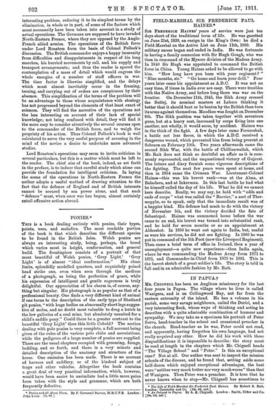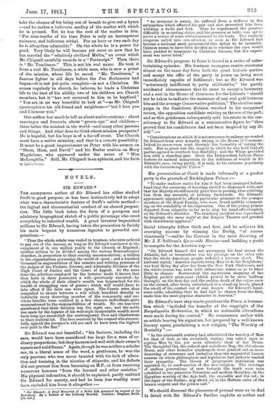IN PAPITA.1.
MR. CHIGNELL has been an Anglican missionary for the last four years in Papua. The village where he lives is called Wanigera, and is on Collingwood Bay, not far from the eastern extremity of the island. He has a volcano in his parish, some very savage neighbours, called the Doriri, and a very interesting flock, whose ways of thinking and acting he describes with a quite admirable combination of humour and sympathy. We may take as a specimen his portrait of Peter Seevo, head-teacher in the school and occasional preacher in the church. Head-teacher as he was, Peter could not read, and apparently, having forgotten his own language, had not really acquired any other. How he did his work with these disqualifications it is impossible to describe : the story must be read at length in the chapters which Mr. Chignell heads " The Village School " and "Peter." Is this an exceptional case ? Not at all. Our author was sent to inspect the mission schools of the diocese, and he found that, setting aside some half-dozen which enjoyed exceptional advantages, the best were "neither very much better nor very much worse" than that of Wanigera. Then Peter was a preacher. It is true that he never knows when to stop—Mr. Chignell has sometimes to • The Life of Field•Marshal Sir Frederick Paul Haines. By Robert S. Bait. London: Constable and Co. LlOs. 6d. net.] t An Outpost in Papua. By A. Chisell. London : Smith, Elder and Co. [10s. 6d. net.] take the chance of his being out of breath to give out a hymn —and he makes a ludicrous medley of the matter with which he is primed. Yet he has the root of the matter in him. "For nine-tenths of his time Peter is only an incompetent nuisance, and ludicrous withal. For an hour or two each day he is altogether admirable." On the whole he is a power for good. Very likely he will become yet more so now that he has married the " relatively civilized Melita," an event which Mr. Chignell carefully records in a "Postscript." Then there is "Mr. Tomlinson." This is not his real name. He took it from a real Mr. Tomlinson, a white man, who is now a priest of the, mission, whose life he saved. "Mr. Tomlinson," a famous fighter in old days before the Paz Britannica had begun—it is not yet quite complete—is not a Christian. He comes regularly to church, he believes, he leads a Christian life to the best of his ability, two of his children are Church members, but it "has not occurred to him to be baptized." " You are in no way beautiful to look at "—so Mr. Chignell apostrophizes his old friend and neighbour—" but I love you and I honour you."
Our author has much to tell us about native customs : about marriages and funerals, about " grown-ups " and children— these latter the noisiest in the world—and many other persons and things. And what does he think about mission prospects P He is hopeful, but his hope is of a far-off event. The Church must have a native ministry, and that is a remote possibility. It must be a great improvement on Peter with his sermon on " Shem, Ham, and David" and his Easter oration on Mary Magdalene, who appeared under the name of " Miss McLoughlin." Still, Mr. Chignell is an optimist, and his faith is in f eet ions.











































 Previous page
Previous page